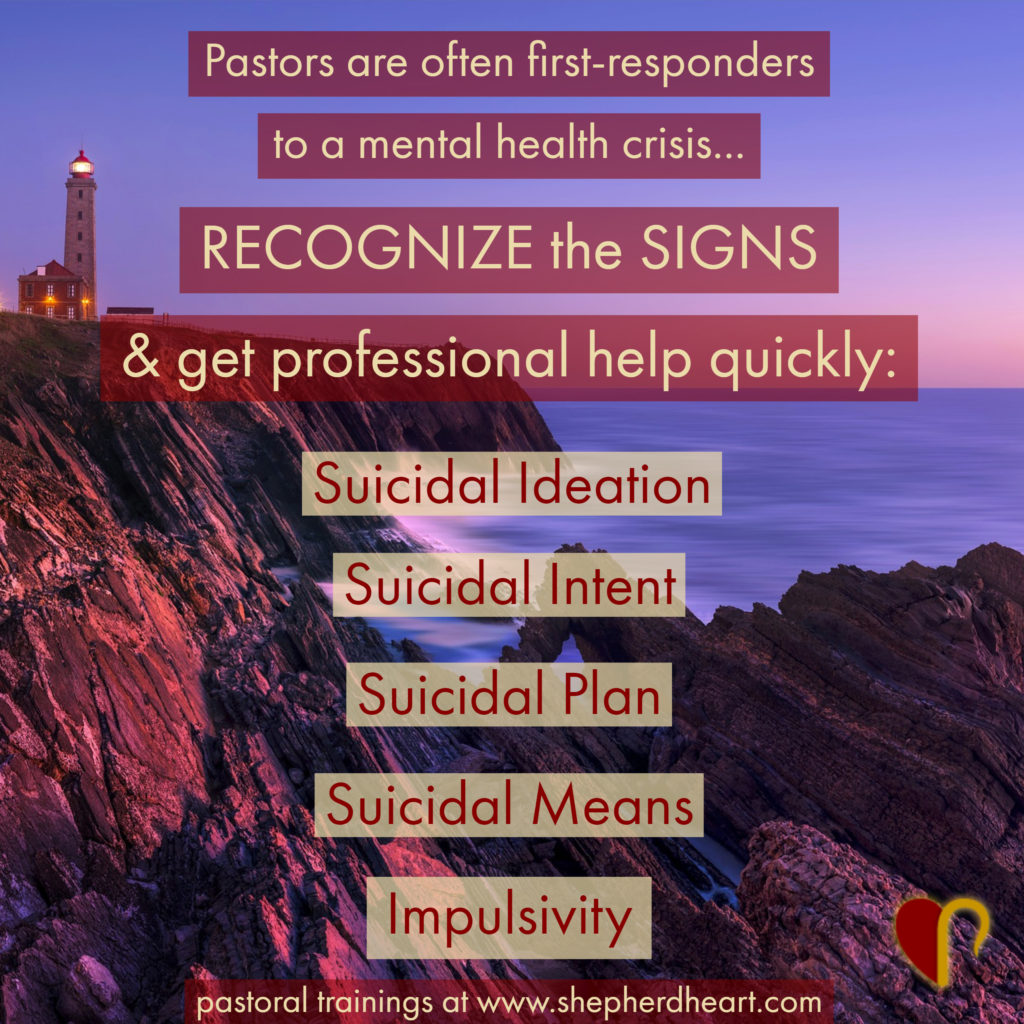
By Dr. Curtis Lehmann
Suicide is a complex and tragic phenomenon. According to Thomas Joiner, suicide involves overcoming our most powerful instinct: self-preservation[i]. Because it involves such potent forces, suicide has become a magnet for a wide assortment of mythologies. Many of these myths are common across cultures, such as the myth that someone who is suicidal is determined to die and cannot be stopped. The World Health Organization combats this particular myth, upholding that “On the contrary, suicidal people are often ambivalent about living or dying. Someone may act impulsively by drinking pesticides, for instance, and die a few days later, even though they would have liked to live on. Access to emotional support at the right time can prevent suicide.”[ii]
But in this essay, I would like to discuss and dispel several myths that are particular to Christianity. I write this as a Baptist, but my earnest aim is to capture the diversity of beliefs among Catholics, Protestants, and other Christian traditions. I hope that these ideas are helpful in clarifying your beliefs and perspectives on suicide, such that you feel better equipped to help those struggling with suicidality.
- Myth: “Christian clergy should not talk about suicide in sermons.”
Fact: Scripture addresses numerous deaths by suicide, including King Saul and his armor bearer, Zimri, Ahithophel, Samson, and Abimilech in the Old Testament, along with Judas Iscariot and the interrupted suicide attempt by Paul and Silas’ Philippian jailer. Moreover, several key Biblical figures experience suicidal ideation, including Moses, Jonah, and Elijah. The inclusion of suicide in Scripture alone would require those being faithful to Scripture to at least occasionally speak on suicide. Moreover, the church ought to be “the inn and the infirmary for those who are sick and in need of being made well.” The church ought to speak to the concerns of those struggling with suicide. Additionally, public health experts have recognized faith leaders as critical “gatekeepers” for suicide prevention in religious communities. Given that 9 million Americans seriously think about suicide every year and over 1 million attempt suicide[iii], it is imperative for clergy to speak a word of encouragement and healing to those considering suicide.
- Myth: “Thoughts of suicide are incompatible with faith in Christ.“
Fact: Thoughts of suicide have occurred to many Biblical figures with strong faith, including Moses and Elijah. Many saints have had thoughts of suicide, as well, including St. Therese of Lisieux, St. Faustina, and Mother Teresa. This myth seems to be intertwined with what has been called the emotional prosperity gospel. Similar to the prosperity “gospel” that teaches that faith will guarantee financial prosperity, the emotional prosperity gospel holds up the false notion that if you have strong faith, then you are guaranteed to be free of mental despair and anguish. However, this notion is false, as Scripture clearly teaches that following Christ demands the willingness to suffer. Moreover, many Christians uphold that thoughts of suicide are intrusions by Satan into the minds of those who follow Christ to discourage them from their faith. From that perspective, thoughts of suicide might in certain circumstances be a sign of strong faith, because the devil is making great efforts to try to dissuade you from Christ’s calling.
- Myth: “Suicide requires the person to abandon their faith.”
Fact: This myth is based upon a misunderstanding of suicide. Suicide is not typically the result of a long rational process but is instead a sudden decision in the midst of emotional turmoil. In fact, most suicide attempts occur within 15 minutes from when the current thought of suicide comes upon the person. People can unfortunately become caught up in a crisis state that alters the way they think, feel, and act in profound ways. A death by suicide most often occurs in the midst of this sort of suicidal crisis, where the person experiences dysfunctional thought patterns, emotional instability, and behavioral agitation. In this state, a person’s core values and beliefs, including their faith in Christ, is still present, but is not immediately accessible to the individual. This loss of accessibility of their core beliefs is also evident in the fact that many people who have died by suicide have been loving spouses and parents. In this suicidal crisis, characterized by a desperate feeling of being trapped, the person is prone to temporarily lose touch with these essential relationships. Although some who die by suicide may abandon their faith prior to the act, the evidence would suggest this is rare.
- Myth: “Christianity teaches that those who die by suicide are condemned to Hell.”
Fact: Historically the church has held positions on suicide that have stigmatized suicide, including forbidding those who died by suicide from last rites and a Christian burial. These early church positions were initially based upon very real concerns that Christians were willingly martyring themselves through suicide. Tragically, these church positions were slow to recognize that suicide was often caused by other factors. Nevertheless, the contemporary perspective on suicide is starkly different, such that no major religious tradition or denomination teaches that all who die by suicide are condemned to Hell. Across denominations, the view of suicide is one of grace and compassion. The Catholic Catechism teaches, “Grave psychological disturbances, anguish, or grave fear of hardship, suffering, or torture can diminish the responsibility of the one committing suicide.” The catechism goes on to say, “We should not despair of the eternal salvation of persons who have taken their own lives. By ways known to him alone, God can provide the opportunity for salutary repentance. The Church prays for persons who have taken their own lives.”[iv] Both the United Methodist Church[v] and the Evangelical Lutheran Church in America[vi] offer comfort that nothing can separate from the love of God, including suicide. Southern Baptists uphold the importance of caring for survivors of suicide, “families who have lost a member to suicide deserve great care, concern, and compassion from Christians and their churches, including the assurance that those in Christ cannot be separated from the eternal love of God that is in Christ Jesus”[vii]
- Myth: “Suicide is an unforgivable sin.”
Fact: Although most traditions argue that suicide is a
violation of the sixth commandment, “thou shalt not kill,” it is also
understood that the sin of suicide remains forgivable. It is true that the
individual who dies by suicide often does not have opportunity to repent of
their sin following the act. However, many Christian traditions do not believe
that repentance is a requisite aspect of forgiveness by God. Moreover, there
are many individuals who have testified that they experienced regret
immediately after a lethal suicide attempt. Certainly, God knows the hearts of
those who die by suicide and may certainly judge them based upon their
intentions.
[i] Joiner, Thomas E. Myths about Suicide. Harvard University Press, 2010.
[ii] https://www.who.int/mental_health/suicide-prevention/myths.pdf
[iii] https://www.cdc.gov/violenceprevention/pdf/suicide-datasheet-a.pdf
[iv] http://www.vatican.va/archive/ENG0015/_P7Z.HTM
[v] https://www.umcjustice.org/who-we-are/social-principles-and-resolutions/the-nurturing-community-161/the-nurturing-community-suicide-161-o
[vi] https://www.elca.org/Faith/Faith-and-Society/Social-Messages/Suicide-Prevention
[vii] http://www.sbc.net/resolutions/1232/on-mental-health-concerns-and-the-heart-of-god

Curtis Lehmann, Ph.D. is a Licensed Clinical Psychologist and Associate Professor at Azusa Pacific University, where he teaches a class entitled the Psychology of Suicide. He is passionate about the intersection of spirituality, suicide, and stigma. Find him at Center for Flourishing.

